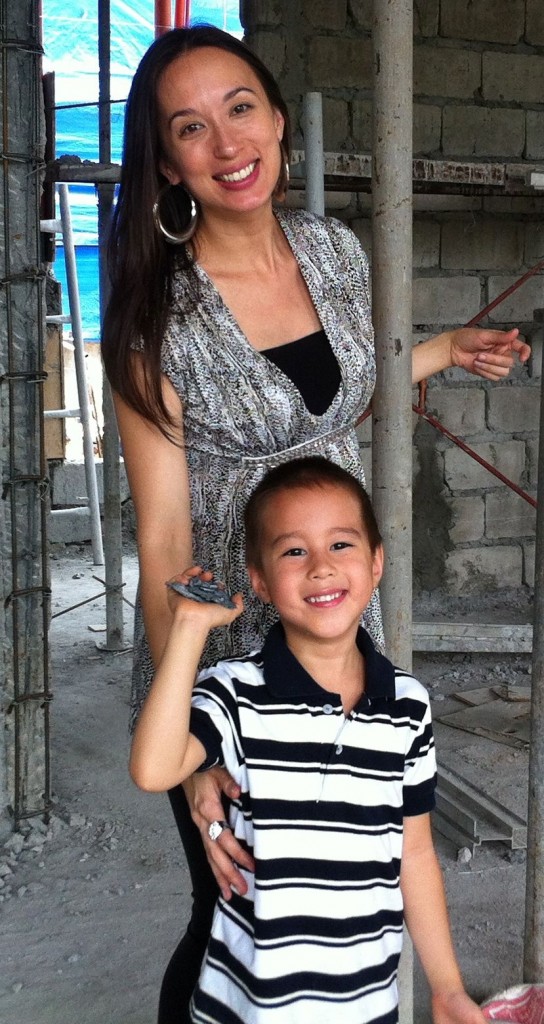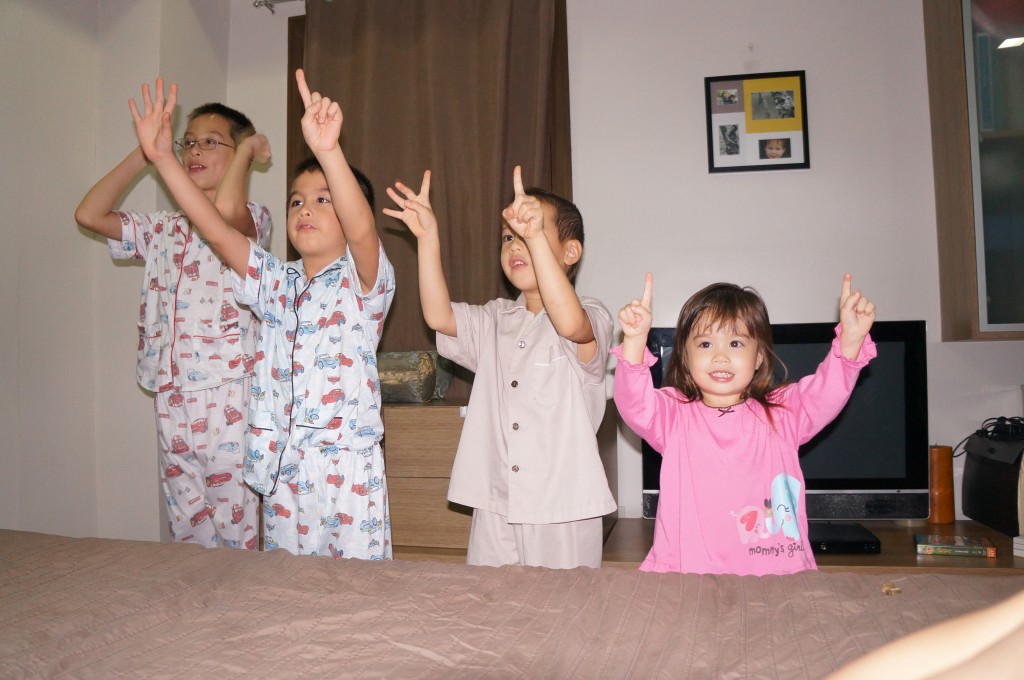Titus is a very mechanically-inclined child. He is my little “tinkerer.” When he enters a room, he will touch whatever he can get his hands on, especially if he is in a room he has never been in before. He will fiddle with objects, turn them around, pull or push at them, or even take them apart if he has enough time to.

I remember going into my friend’s dermatology clinic and Titus made a bee-line towards all the breakable objects, trying to pick them up or shake them. There was no malice or intent to destroy. He was simply exploring. I had to ask him to stop though because there were a number of fragile decorations that could have crashed onto the floor. He listened but I could tell that his fingers were itching to grab a hold of something…anything.
As his homeschool teacher, I have to be sensitive to this learning style of his and not curtail it too much, especially at home where his personality doesn’t have to be stifled. Our house is pretty child-friendly. I am not too particular about the kids breaking things. It happens. Life goes on.
Giving him his space to grow and develop the way God designed him to has been a wonderful sort of “experiment” to help me understand how my children learn. Titus is the kind of person that thrives when he is able to observe, experiment, and practice without the pressure of outcomes.
For instance, he has been writing words lately, not because I asked him to but because he was ready to, on his own. The most recent handwriting work I asked him to do was to copy the letters I wrote down in big and small caps. I only required him to do a page a day. But, through this exercise I discovered that he already knew how to write his letters.
How did this happen? It’s really quite a mystery. I have not made him do pages and pages of handwriting work. But I do let him draw, color, paint, cut, and paste a lot which has probably strengthened his finger muscles. On occasion I give him minimal doses of penmanship practice.
So it delighted me to witness his attempts to write out everyone’s names — family, cousins, as well as words that he was trying to sound out on his own. He spelled the word “start”, for instance, on top of his drawing of a maze.
I asked him, “How did you learn how to write?” I wanted to be able to take some credit but his answer was, “I just watched Edan. I saw how he did it.”

This really got me thinking about the blessings of having more than one child, especially because we are a homeschooling family. The younger children benefit from the older ones and their examples.
When I am concerned that I don’t get to invest the same amount of time teaching my two younger kids that I did with my two older ones, I am pleasantly delighted to discover that they teach one another, intentionally or not.
The same thing happened with my youngest sister, Carolyn, when my mom was homeschooling us. She learned to read very early. One morning she came up to my mom and confidently said, “I know how to read, mom.” My mom was incredulous because she hadn’t really taught her to read. Carolyn was included in our homeschooling, but she was much younger than all of us so her studies were not too formal. However, when my mom asked Carolyn to demonstrate her ability to read she was able to do so.
Sometimes, as a mom, you come into the homeschooling experience with many doubts and questions. Will my kids turn out alright? Can I really do this even if I am not an educator? Is homeschooling going to give all my kids a good education? Having bought into the notion that conventional schooling will meet these needs more effectively, we tend to feel insecure about our ability to teach our children. Our preconceived ideas about how children learn and the context in which they learn is biased in favor of the institutional set-up. Yet, I am discovering more and more as my children grow and mature that they are learning all the time and in ways that often surprise me.
Without the impediment of time frames, lesson plans, leveling, same age groupings, and pressure of grades, they naturally discover, create, investigate, problem solve, interact, and imitate what you want them to.
God has designed each child with the potential to learn. And I have to trust in this innate capacity and nurture it. My greater role is to train my kids so they are disciplined, responsible, attentive, and obedient. I also need to instill in them a love for the Lord. This is the bedrock, the indispensable foundation that must be present in the hearts of my kids.
While standards and checklists are helpful as a reference, I have to remember that these should not define, box in, or ignore the uniquenesses of my kids. If Titus is not writing sentences at age 5 like school aged children might be doing, so what? He still has time to acquire that ability.
I do not doubt that he will if I constantly provide an environment that encourages the love for learning — an environment where there is joy, unconditional acceptance, generous praise, access to books, materials, and toys that stimulate creativity, and the formation of character and godliness. But what an impossible environment to have if I am not grace-filled and spirit-led. Unless the Lord is at work in my own life, I can be tyrannical, overbearing, demanding, and selfish as a teacher…all the things that can destroy my children’s desire to learn. So I have to be in continual partnership with Christ who designed and tenderly made the children he has entrusted to me. I need to be sensitive to his leading when he tells me I need to improve or modify the way I instruct my kids.
This morning, Titus climbed into bed next to me and I held him for a bit because I wasn’t fully awake. He snuggled up beside me and I wrapped my arms around him. My right hand happened to rest on the part of his chest where I felt his heart beating. I imagined that little, unique heart of his in my hand and I thought of my other children’s, too. And this was the prayer that came to me…
How fragile, Lord, are my kids. How easily wounded if I am not careful. How tender are their consciences. How opportune the season to plant your truth in them. May I not trample upon their fragility or desecrate their consciences with my own sinfulness. You have made me steward of four extraordinary treasures. I cannot be faithful to this trust if you do not supply the extraordinary help. So I look to you to teach me how to hold the hearts of my children. Let me treat motherhood as a sacred offering of love, time, and sacrifice that directs my children to you, to reflect and live for your glory. Reveal to me what I should teach and what I need not fret over, and calibrate my responses and instruction according to what pleases you so that each of my children can be redeemed and prepared for your purposes! Amen!



very inspiring post Joy! i’m not a homeschooling mom but every time I read your homeschooling stories i get a sudden burst of inspiration. keep sharing. keep inspiring more parents!
Thanks Faye! Praise God. Maybe someday, you will consider becoming one…he he he.
hello ate joy!
you are very blessed to have a very responsible kids. I seen you last last sunday at CCF that time you have a testimony and also ate Carolyn. I want you to know how much I appreciate you continue the home school for your kids. when i was at 7 years old We went to south east asia a nation who is strictly communist and we live at the center of that country(vietnam Hanoi) and I have been homeschooling for 2 years ,I struggle because it’s my first time to be home school at the same time my mom will be giving birth that time to my younger sister. By God’s grace I was able to finish my 2nd and 3rd grade and after wards we came back here to the phillippines and I transfer to a big school. Thank you for your blog that still open’s my mind of the goodness of having homeschooled. I will be true that homeschool has been one of my strong foundation in academics. Hope to see you around at CCF and Ipray for your coming baby girl. God Bless you as you continue to bring the light of hope to many people .
<3 audrey
Thanks Audrey! God bless you!!!
I agree with your prayer, Joy. And it’s good that you mentioned about gauging your child’s learning based on conventional education. Because majority have been raised in a formal school during their young lives, many parents feel that homeschooling provides less learning than what a conventional school offers. Right now I still hear naysayers in my circles when I tell them I’m going to homeschool my son and our future children. How do we deal with these?
Oh, i need this 🙂 Thanks for this entry, it’s really a big encouragement and reminder for me while homeschooling and while I tend to get on the defensive mode when people wonder why we choose to homeschool. God bless! 🙂